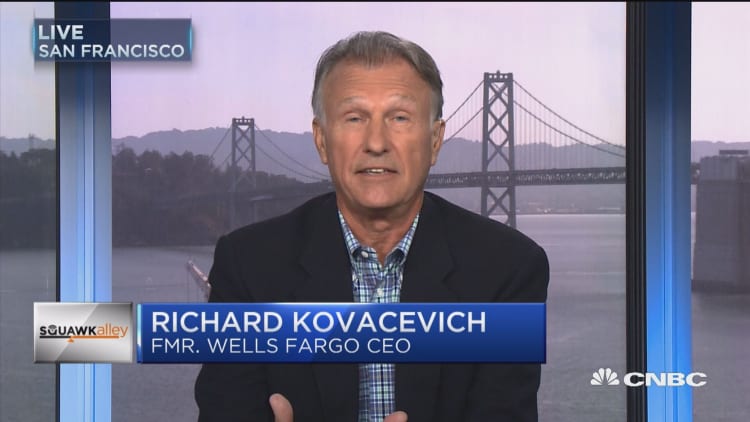
Former Wells Fargo CEO Richard Kovacevich said Tuesday that it is possible the stock market could be in a bubble.
"If you go back to what happens many times, when the economy is improving, the stock market goes down, because they're fearful that the Fed is going to raise interest rates," Kovacevich said on CNBC's "Squawk Alley."
"If that isn't a good example of a bubble, I don't know what is," he added. "The stock market should like economic growth, and if that causes — which it should — interest rates to rise, that's fine."
The Dow Jones industrial average and the S&P 500 closed at record highs on Monday. The Dow, S&P, and Nasdaq all hit intraday all-time highs during the session, but the Nasdaq finished just shy of a closing record.
U.S. stocks have been hitting record highs in 2017 despite Fed projections for a third interest rate hike sometime before the end of the year. The central bank has raised rates four times in the past two years, including moves in March and June.
The Fed is not expected to hike rates after its two-day September meeting, which began on Tuesday. The market odds of a December move are about 56 percent, according to the CME FedWatch tool.
In the latest CNBC Fed Survey of 42 Wall Streeters, 76 percent of the participants said they see a Fed hike in December.
In an op-ed published in the Wall Street Journal on Sunday, Kovacevich said the U.S. central bank should stop worrying about low inflation and instead learn to love it.
On Tuesday, Kovacevich said the Fed shouldn't base its policies on where inflation is. He also asked why would anybody want higher inflation.
"The average worker has had about 2.2 percent increases in their wages over the past few years," he said. "If the Fed had achieved their goal of 2 percent, almost their entire wage increase would be wiped out by inflation."


